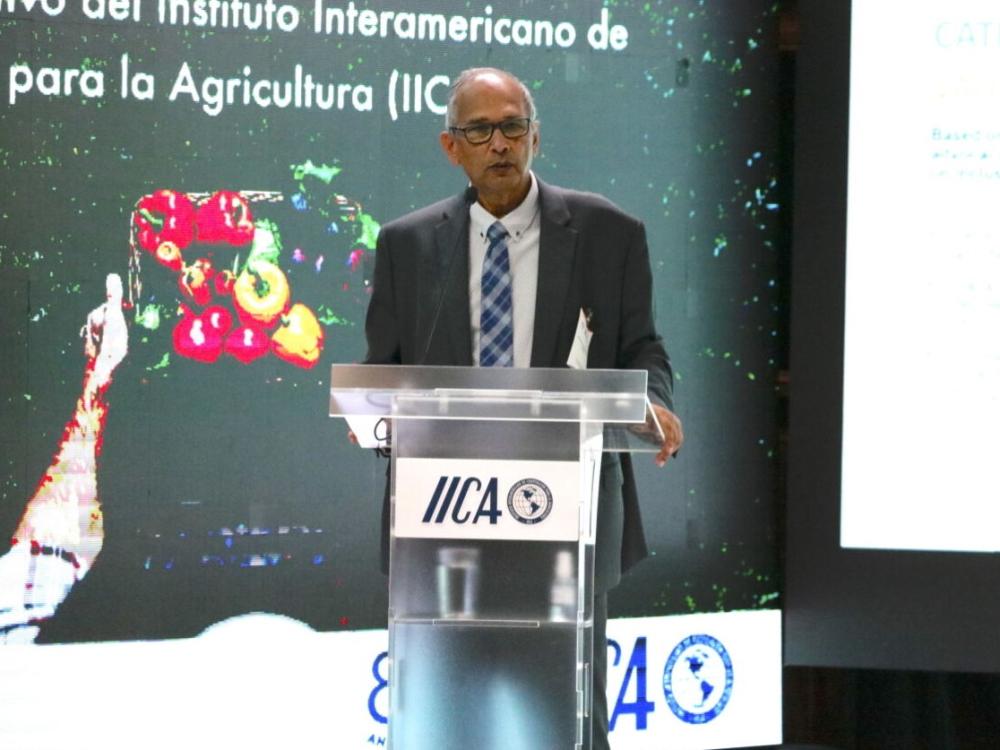Nearly 150 people from 26 countries in the Americas took part in the webinar “Main outcomes of COP28 and implications for agriculture.”

San José, April 12, 2024 (IICA). In the global environmental discussions that took place last December at the United Nations Conference on Climate Change (COP) in Dubai, United Arab Emirates, the voice of agriculture was heard thanks to the important participation of public- and private-sector stakeholders, with the agricultural authorities of the countries of the Americas and the Inter-American Institute for Cooperation on Agriculture (IICA) playing a leading role.
Nonetheless, sector stakeholders need to play an even bigger role in the discussions and the decision-making process.
This was the view expressed by the speakers in the virtual seminar “Main outcomes of COP28 and the implications for agriculture,” in which nearly 150 people from 26 countries in the Americas took part. IICA organized the event in conjunction with the Executive Secretariat of the Central American Agricultural Council (CAC).
In Dubai, IICA, in collaboration with the ministries of agriculture of the countries of the Americas and other partners, installed a pavilion called the Home of Sustainable Agriculture of the Americas, which hosted high-level discussions on the role of the region’s agriculture in combating climate change.
Thus, in the world’s largest environmental forum, agriculture in the Americas demonstrated its importance as a key player in global food security and showcased the progress being made in the use of new practices and the adoption of new technologies, which allow it to sequester carbon and make a crucial contribution to the fight against climate change.
The speakers in the webinar were Muhammad Ibrahim, IICA Director of Technical Cooperation; Lucrecia Rodríguez, Executive Secretary of the CAC; Walter Oyhantçabal, IICA advisor on climate change and stock raising; Marlene Mazariegos, Manager for Sustainability at the Chamber of Agriculture of Guatemala; and Kathya Fajardo, IICA climate change specialist.
The challenge of moving from words to action
During the discussions it was pointed out that, in both developed and developing countries, there are interests seeking to prolong the use of fossil fuels for as long as possible. It was also noted that, as all decisions in the climate negotiations are taken by consensus, the language used in the documents adopted tends not to be very ambitious, limiting the possibilities of rapid action.
It was also observed that the future plans for agriculture must be included in the new nationally determined contributions (NDC), in 2027, in which countries will set out their commitments regarding climate change mitigation and adaptation.
It was also emphasized that there are issues that cut across all sectors (such as the Loss and Damage Fund and discussion of the new global financing goal) which are also important for agriculture.
Muhammad Ibrahim stressed that the COP produced many important outcomes that needed to be addressed. “We must agree on an agenda as we begin preparing for the next COP, and explore where the opportunities for climate financing lie,” he said.
The CAC’s Lucrecia Rodríguez referred to the importance of the joint work with IICA. “We must now focus on how we keep the agriculture agenda alive, as we embark on the road to COP29,” she said.
Marlene Mazariegos, from the Guatemalan Chamber of Agriculture, emphasized that agriculture is the first sector to be impacted by climate change: “Agriculture isn’t the problem, it’s part of the solution, as it can play a significant role in mitigation and adaptation through the adoption of sustainable practices and the promotion of more resilient, low-carbon food systems.”
Kathya Fajardo referred to COP30, which will be held next year in Brazil: “It will be a great opportunity for the region, as we shall be better placed to communicate the situation in our countries in general, and in the agriculture sector in particular, with the private sector and producers as part of the discussion.”
More information:
Institutional Communication Division.
comunicacion.institucional@iica.int











